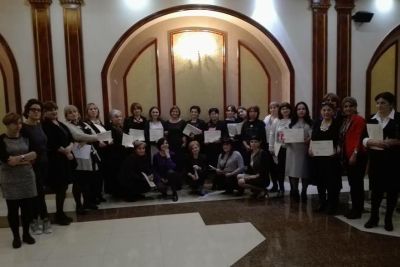Capacity building of the service providers for domestic violence survivors launched
Date:
On 16-18 October, 2016 in Borjomi Palace Hotel, training of 23 employees (nurses, social workers, lawyers, nannies, phycologists and the hotline operators) of the domestic violence survivor’s shelters in Sighnaghi; Gori; Batumi and Kutaisi; the shelter for the survivors of human trafficking and domestic violence in Tbilisi as well as those of the newly opened Crisis Center in Tbilisi has been launched.

The participants of the training of the service providers for domestic violence survivors; Photo: UN Women
During the training the personnel has discussed concrete complicated cases and examples and presented relevant decisions and results based upon the multidisciplinary work.
Ms. Tamar Barkalaia, Director of the State Fund for the Protection and Assistance of the (Statutory) Victims of Human Trafficking underlined that “It is of paramount importance to involve the personnel having actual relationship with the beneficiaries living in the shelters i.e. nannies/nurses along with other professionals. Such kind of activities are propitious for the teamwork, which has positive impact upon the quality of the service offered to the victims of violence”.
The second round of trainings for 34 employees of the service provider institutions will be conducted on 23-25 October 2016.
The State Fund established shelters for domestic violence survivors, the first crisis center and the nation-wide domestic violence hotline 116 006 with the support of UN Women, with funding from the Government of Sweden.
UN Women in partnership with the government of Sweden and European Union further plans to support expanding of the network of crisis centers in other regions of Georgia, providing services not only to the victims of domestic violence but also to the victims/survivors of sexual violence outside the context of domestic violence. The plans also include elaboration of standards for the service provision for the victims/survivors of sexual violence and development of a training-module on the issues of sexual violence for the employees of the state-run center, shelters and the hotline.